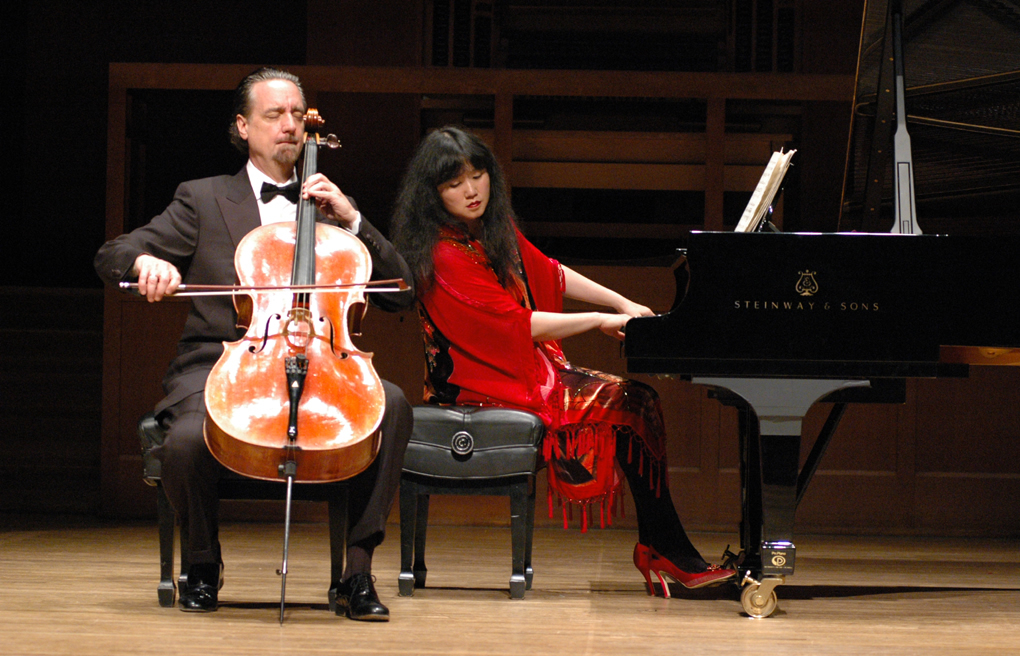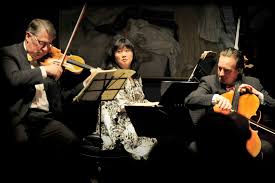Chamber Music's Dynamic Duo
David Finckel & Wu Han (photo: Lisa-Marie Mazzucco
“It is incredibly important to be kind and a skilled negotiator. These are qualities that are required in order to be successful as a chamber musician.”
Quintessential Chamber Musicians and The Perfect Musical Couple are expressions that come to mind when describing the dynamic duo of cellist David Finckel and pianist Wu Han. They are partners in marriage of over thirty years and Co-Artistic Directors of several prestigious venues including Chamber Music Society of Lincoln Center, Music@Menlo in Northern California and Chamber Music Today festival in Seoul, South Korea.
They appear worldwide in a dizzying schedule of concerts that feature solo, duo, piano quartet performances in addition to trio collaboration with violinist Philip Setzer – engaging audiences with contemporary and mainstream repertoire such as piano trios of Beethoven, Mendelssohn and Dvorak. And they devote time to something that is dear to their artistic souls - teaching and mentoring young artists at venues like the Music@Menlo Chamber Music Institute, LG Chamber Music School in Seoul and Aspen Music Festival chamber music workshop.
Finckel’s association as cellist of the award winning Emerson String Quartet spanned 34 years, and he is currently on the faculty of The Juilliard School and Stony Brook University. Both David and Wu Han founded the ArtistLed label, an internet-based recording company of which their own performances are featured. David Finckel and Wu Han share thoughts about the art of chamber music collaboration with Editor Leonne Lewis.
You are both experienced chamber music players and enjoy international careers. What makes your collaborations so musically in sync?
In order to play chamber music, one needs to be both a leader and a supporter. The art of chamber music requires a performer to be flexible in assuming both of these roles at different times, depending on what the score requires of the performer. Of course, diplomatic skills and sensitivity to other points of view are also of paramount importance, both in rehearsal and in real life. It is incredibly important to be kind and a skilled negotiator. These are qualities that are required in order to be successful as a chamber musician. Our experience collaborating with countless musicians, assuming artistic leadership roles and cultivating a supportive environment wherever we work have really helped us develop these skills.
Is diversity of programming important?
It is essential for there to constantly be new artists emerging and new works of art being created to propel an art form forward. Identifying and grooming the next generation of elite young performers is some of the most important work for any artistic director – so that the next generation is capable of not only carrying the torch of our art form forward, but also of helping to add new compositions to the wealth of the chamber music repertoire. Both tasks are equally important for our field.
Teaching seems to be a vital part of your musical lives. During David’s studies with Mstislav Rostropovich, what valuable advice did you receive from him? And during Wu Han’s studies and collaboration with Isaac Stern and Menahem Pressler, what tips did you receive as a chamber music pianist?
Rostropovich used to tell me to “Always represent the composer” and also that “Anything is possible.” Both statements have stuck with David, since his years of study with Rostropovich, as some of the most valuable musical advice he has ever received. My work with Isaac Stern and Menahem Pressler, both masters of the art form, taught me that chamber music is the most communicative art form in existence – and a perfect vehicle for teaching technical control and musicality. The most valuable tip I ever received was that if one is able to achieve total technical control of their instrument, they are then capable of producing any timbre of sound in order to match the unique sounds of strings, woodwinds and singers. As a pianist, Stern and Pressler pressed me to do just this.
Does playing chamber music help develop a sense of musicianship?
In order to play chamber music at the highest possible level, one must possess a total understanding of the complete score for any given work. Furthermore, one must also assume direct responsibility for their own musical ideas and stylistic interpretation, instead of relying on teachers or recordings for an artistic approach. Playing chamber music helps performers test and strengthen their musical and interpretive beliefs, while also providing the opportunity to work with many other musicians in exploring a plethora of different musical ideas and approaches – all in pursuit of a successful performance. This training and experience is crucial for any performer that is seeking to develop a strong, individual musical voice. www.davidfinckelandwuhan.com
CLICK THE LINK TO READ ABOUT DAVID FINCKEL AND WU HAN CONCERTS



